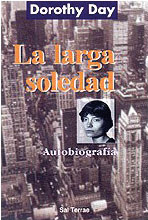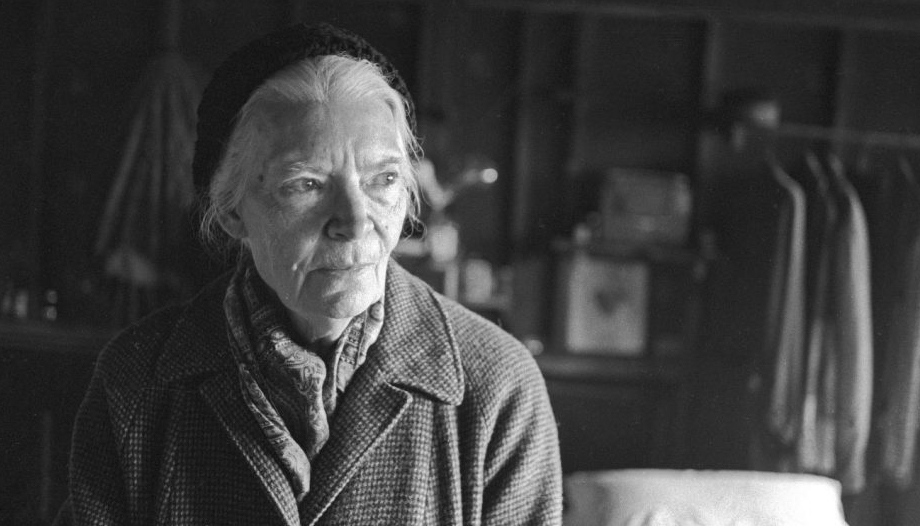"In these times" -said the Pope on September 24. "in that social issues are so important, I cannot fail to name the Servant of God Dorothy Day, founder of the Catholic Worker movement. Her social activism, her passion for justice and the cause of the oppressed were inspired by the Gospel, her faith and the example of the saints."
These words of the Pope led me to read his 1952 autobiography, The long lonelinessthe magnificent biography of Jim Forest All is Grace: A Biography of Dorothy Day (Orbis, 2011), and several of his writings, among them the recent translation of My conversion. From Union Square to Rome, 1938. It seems to me that, in this age of secularization, Dorothy Day is a fascinating character because of her intimate union with God and her commitment to those most in need. Day's life reveals a deep mystical experience that led her to conversion, to the highest levels of spirituality, and to discover the face of Jesus Christ in those most in need.
He writes, for example, in a passage of The long loneliness: "If you lack time, sow time and you will reap time. Go to church and spend an hour in quiet prayer. You will have more time than ever and you will get your work done. Sow time with the poor. Sit and listen to them, waste your time with them. You will receive a hundredfold of that time. Sow kindness and you will reap kindness. Sow love and you will reap love. And, once again, he would say with St. John of the Cross: 'Where there is no love, put love and you will get love.'" (p. 268) What practical wisdom is contained in these brief lines!
A significant biography
Dorothy Day was born in 1897 in Brooklyn, New York, the daughter of a sports journalist. With her family she moved to San Francisco and then to Chicago; from her early years she worked taking care of her siblings and in multiple jobs outside the home. She studied on scholarship at the University of Illinois and after two years she dropped out. He moved to New York where he led a bohemian life and developed his social activism in contact with anarchist groups: "I oscillated between loyalty to socialism, syndicalism and anarchism. When I was reading Tolstoy I was an anarchist; Ferrer with his schools, Kropotkin with his agrarian communes, the men of Industrial Workers of the World with their solidarity and their unions: all of them attracted me." (p. 71). In his obituary published in the magazine Time in 1980, it was recalled that to her admirers, such as historian David J. O'Brien, Dorothy Day had been "the most significant, interesting and influential person in American Catholicism." And it was so, because in the movement of the Catholic Worker combined her zeal for reforming society as a whole with her practical concern for helping individual poor people. She was arrested a dozen times, the first as a suffragist in 1917, the last on the occasion of a demonstration in California in 1973, and took part in many, many labor and anti-war protests.
Benedict XVI said of her on February 13, 2013: "In her autobiography, she openly confesses to having fallen into the temptation to solve everything with politics, adhering to the Marxist proposal: 'I wanted to go with the demonstrators, go to prison, write, influence others and leave my dream to the world. How much ambition and how much search for myself there was in all this!'. The path to faith in such a secularized environment was particularly difficult, but Grace acts just the same, as she herself stressed: 'It is true that I felt more often the need to go to church, to kneel, to bow my head in prayer. A blind instinct, one might say, because I was not conscious of praying. But I would go, I would get into the atmosphere of prayer...'. God led her to a conscious adherence to the Church, to a life dedicated to the disinherited.".
Following the birth of her daughter, she converted to Catholicism in December 1927. She leaves her partner, the anarchist Forster Batterham, who did not want to marry, and concentrates on the child's education. She went to Mexico to get away from Forster, but when her daughter fell ill with malaria, she returned to New York. In 1933 she meets the radical Catholic Peter Maurin, with whom she founds the newspaper Catholic Worker which would henceforth be the dynamic axis of his life, together with the centers for the poor in cities and rural farms. The newspaper was widely distributed for decades. There are now more than 200 Catholic Worker in the United States and another 30 in various countries.
Newsroom
The Spanish reader is struck by Day's admiration for Ferrer Guardia, the anarchist founder of the Modern School, condemned and executed in 1909 for his alleged participation in the Tragic Week of Barcelona. It is surprising that Ferrer's pedagogical ideals had a notable impact in the United States, although some of his texts are crudely anti-religious. "Where were they?" -Dorothy Day writes in her autobiography (p. 162). "the priests who should have gone out in search of men like the Spanish anarchist Francesc Ferrer i Guardia, acting with them as the Good Shepherd had acted with the lost sheep, leaving the ninety-nine - the good parishioners - to go in search of the one that was lost, to heal the one that was wounded? No wonder that in my mind and in my heart there was a very acute conflict.". Also noteworthy is his active pacifism in the Catholic Worker during the Spanish Civil War in the face of the support of the American Church for the national side as a result of the martyrdom of so many priests and nuns and in the face of the support of the official authorities for the Republican side.
In this Year of Mercy, the figure and thought of Dorothy Day take on new relevance, even with some controversy: "Among the works of mercy are: teaching the unlearned, rebuking the sinner, comforting the afflicted, and patiently bearing with the unjust; to these we have always added: picketing and distributing propaganda."he writes, for example, in his autobiography (p. 235).
It is worthwhile to close this brief review of the book with a few beautiful lines from the epilogue: "The final word is love. [We cannot love God if we do not love one another, and to love we must know one another. We know Him in the act of breaking bread, and we know one another in the act of breaking bread and we are never alone. Heaven is a banquet and life is also a banquet, even with a crust of bread, where there is community. We have all known the long loneliness and we have all learned that the only solution is love and that love comes with community." (p. 303).
To learn more

The long loneliness, Dorothy Day. 312 pages. Editorial Sal Terrae, 2000.
My conversionDorothy Day. 176 pages. Ediciones Rialp, 2014.
Dorothy Day: a journalist committed to the social equity on the road to sainthood, Rome Reports (2013).
Dorothy Day, a saint of our time, Ron Rolheiser. Round City. 7-IX-2015
The strength of an angel (movie) . Original title: Entertaining Angels: The Dorothy Day Story (1996).








